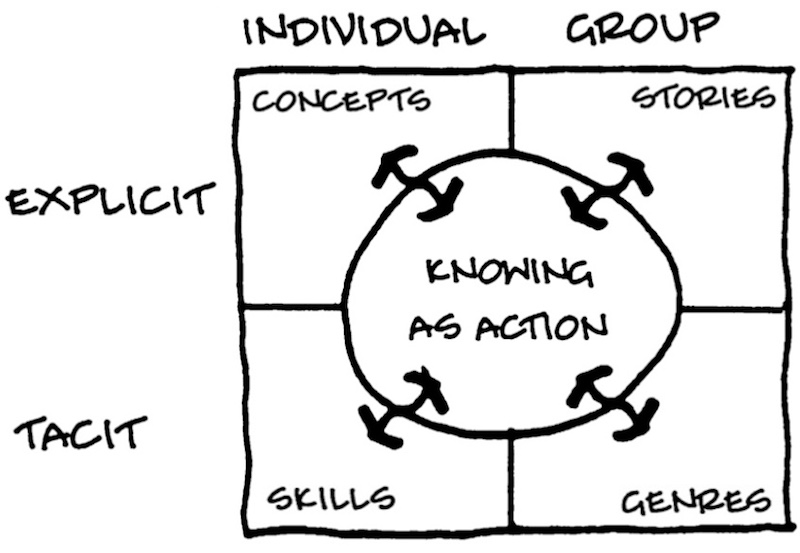Here we consider aspects 'below the line' in the dance-of-knowing schema.
As written and speakable descriptions - elements of ‘a language’ - patterns sit above the line in the schema. But as below-the-line **performances of knowing**, in which patterns are skilfully 'picked up', sniffed out and mobilised - walking the talk of critical, materialist reflection - it’s **the practice** that comes to the fore: Pattern language(ing).
While 'language' may still be a helpful simile, it's *'language of action'* - quite a complex metaphor!
The *genre* of developing and mobilising patterns involves **pods of collaborative work**, between pattern-stewards (members of the schools of the college) and members of partner organisations (coops, civil-society organisations, municipal administrations, social enterprises, etc): activists in making the living economy.
These two categories are by no means disjunct; we would expect members of the college to be economy-making activists too, alongside the political economy of the college itself. But in the facilitative, co-production practice of the college - in pods - the roles are distinct. Members of the college have roles as stewards of the pattern language, as a cultural commons, while members of partner organisations have roles as stewards of other commons: commons of provision in the living economy.
Pod practice is a form of ‘circle’ practice: a cousin of . . - study circles - important for example in feminist culture, in *Capital* reading groups and in the culture of Afro-American cooperation \[Nembhard xxx] - action-learning sets \[Checkland xxx], and - design circles \[Vehvilainen xxx; Hales and O’Hara xxx; Greenbaum & Kyng xxx; Cottam xxx; Design Justice xxx]).
> Further aspects of genre, constituting an institutional culture of pattern-based production of activist literacy, and commons of both patterns and capability, are significant in college practice too: see the next section.
The dance of knowing, as a conceptual frame, is a container for an important element of the curriculum of a college of formacion: a theory of the practice of capable knowing. But pattern language(ing), as *practice* in the college, *is* the dance. Thus the School of pattern language(ing) in the Faculty of formaciòn work has an important dual, reflexive role: not only as a facilitator of making the living economy, but also as provider and steward of infrastructure within the college itself. This kind of reflexiveness is characteristic of several Schools in the college.
The other below-the-line quadrant - *skill* - is perhaps less central with regard to patterns. But a repertoire of documented descriptions, evolving over time and across distributed communities of researcher-developers into a commons, and mobilised fluently through retrieval and setting-alongside one another and sharing, calls for a whole field of skill . . - in document handling and curating and, probably . . - some specialised tools, probably digital; and in that case . . - well-architected and well-operated as P2P infrastructure; quite possibly . . - built on a distributed hypertext software architecture, for example federated wiki [http://mh.federated.wiki].
See an anticipatory map of Schools in the Faculty of formaciòn work (pattern families).
